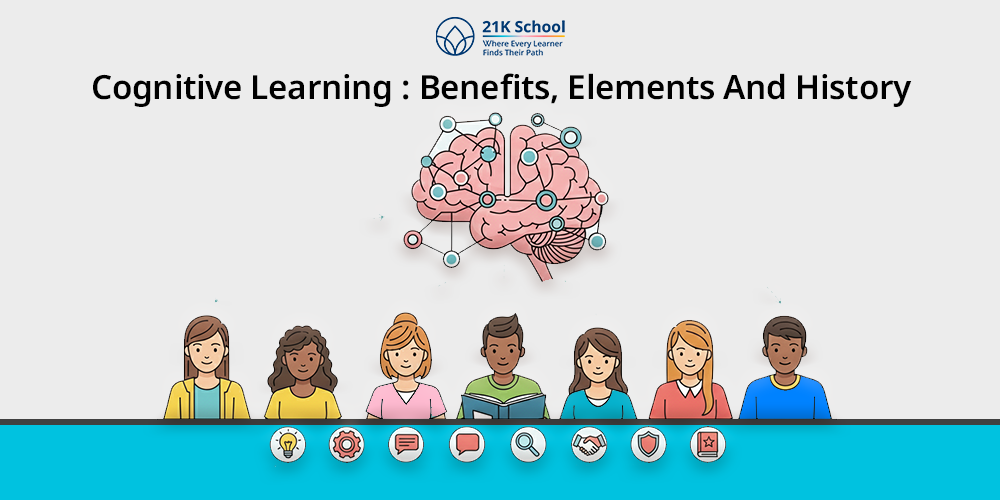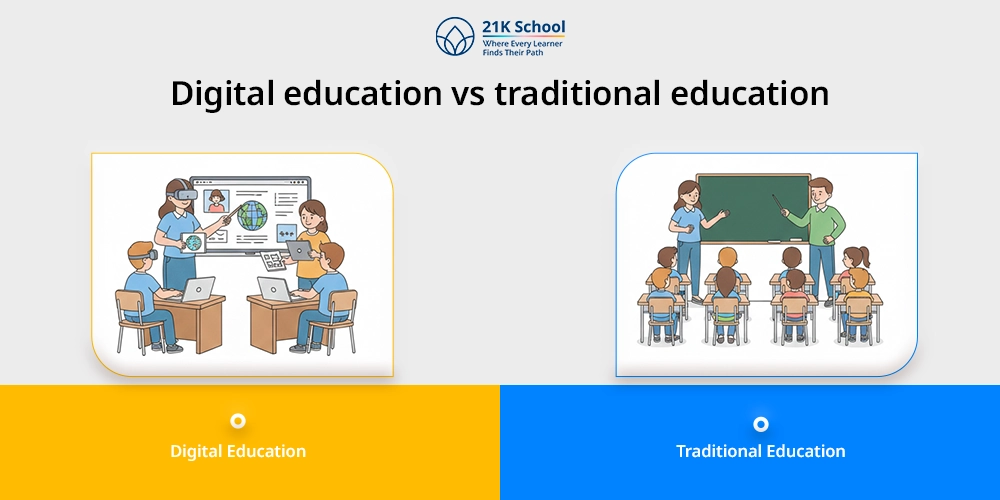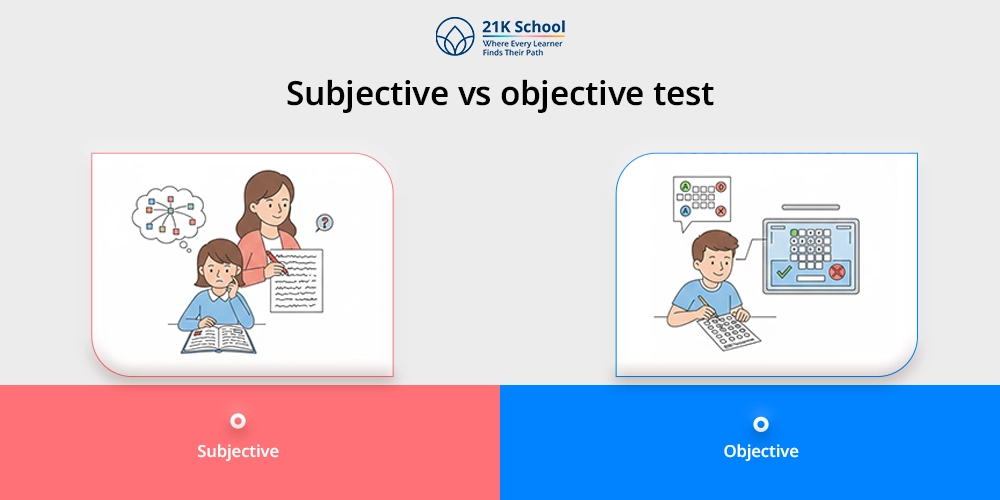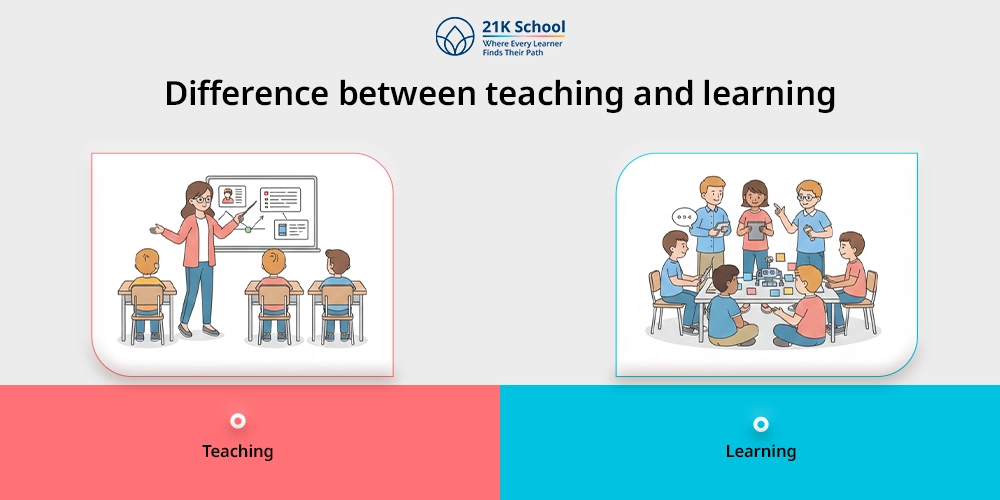
Have you ever thought about how cognitive learning is related to brain development?
Cognitive learning is an active learning method which focuses on maximising the brain’s capacity to remember things. Cognitive learning enhances memory retention by maximising the learning potential and brain development.
Cognitive learning is often related to children’s education as through proper cognitive development of children they are better able to perform in their academics. However, cognitive learning is not only limited to academics but widely used in organisation as well.
Cognitive learning allows students to learn and remember information quickly as well as understand difficult concepts more easily. The human brain is responsible for activities such as thinking, concentration, learning, solving, and so on.
This allows students and individuals to process any information more actively through proper cognitive development. Cognitive learning mainly focuses on understanding of concepts rather than memorisation. This also allows students to make a relation between new concepts and old concepts.
Contents
What is Cognitive Learning?
Cognitive learning is a mental retaining process of learning, which allows students think in a more active way. In simple words, cognitive learning is a mental ability which enhances the knowledge retention by improving the ability to remember information for a longer period of time.
Cognitive learning doesn’t only focuses on the memorisation of facts and figures instead it allows childrens to develop a deeper comprehension of the subjects. Through cognitive learning students are better able to enhance their memory capacity which allows them to develop interest towards learning.
Cognitive learning allows children to learn concepts for a longer period of time, which is especially beneficial for subjects such as Maths, Literature, History and Science.
Developing cognitive learning skills is very essential for enhancing childrens mental health as well as allowing them to make a relation between new information and old information.
Elements of Cognitive Learning
Cognitive learning becomes more effective by utilizing sole elements which enhances the learning adaptability. Cognitive learning is all about thinking from a different perspective rather than only focusing on memorisation.
The elements of cognitive learning basically include active learning, social learning , metacognition, scaffolding and so on.
This allows kids to focus on developing a deeper understanding of the concepts. Here you can check the elements of cognitive learning.
1. MetaCognition
Metacognition is a thoughtful process which allows students to analyse different learning styles. Metacognition can be defined as the process of analysing different learning methods.
Metacognition is considered as an effective element of cognitive learning that focuses on developing curiosity and awareness among childrens. Through metacognition, childrens are better able to analyse different styles of thought process, which cultivates their growth mindset .
2. Active Learning
Active learning allows childrens to focus on the active studies rather than passive learning. Active learning enhances students critical thinking skills , which improves their spatial awareness.
Through this element of cognitive learning, childrens can engage in their studies, which allows them to focus on the thought processing. Indulging in group activities and teamwork also helps in enhancing active learning among students.
3. Social Learning
Social learning helps in developing collaboration skills among children. Social learning incorporates collaborative projects, allows them to develop social relation.
This element of collaborative learning allows children to engage in studies through the sharing of knowledge.
Social learning is an effective strategy to engage students in peer-to-peer learning as well as develop a collaborative learning environment.
4. Cognitive Theory Learning
Cognitive theory learning or cognitive load theory, can be defined as a procedure of acquiring the knowledge of multiple mindset and their capacity of grasping knowledge.
This method is popular for distributing work load equally, by enabling students to remember concepts for a longer period of time. This enhances students mental health and their ability to acquire information more quickly.
5. Scaffolding
Scaffolding is a element that’s main aim is to provide childrens with needed support and guidance. With the help of scaffolding children are better able to gain confidence through which they can work independently.
This allows children to apply their learned knowledge into real world scenarios. This also boosts children’s ability to think more precisely.
Examples of Cognitive Learning
Cognitive learning provides clear ideas about topics which enables students to clarify their understanding and proficiency. Cognitive learning contains various learning aspects that focus on the development of children’s learning ability.
Cognitive learning helps in recognising the problems in the first place and enables them to improve their ability to problem solving . Here you can check the examples of cognitive learning mentioned below.
1. Experiential Learning
Experiential learning is an effective example of cognitive learning, in which students learn by doing rather than focusing on theoretical studies . Through experiential learning , children are better able to make a relation between real world and understandable knowledge.
Experiential learning allows children to learn through experience and hands-on activities. This also allows children to engage in an active learning method which focuses on maximising the effectiveness of students.
2. Explicit Learning
Explicit learning is the process of acquiring new skills intentionally, which help in improving the learning efficiency of students.
Through explicit learning childrens can develop deeper understanding of knowledge, which helps them to make relations between new and the existing knowledge. This allows childrens to implement their acquired knowledge through differentiation of ideas.
3. Implicit Learning
Implicit Learning is the opposite of explicit learning, in which students learn new skills through passive learning rather than active learning. In Implicit learning, children are unaware of the new knowledge and acquire new knowledge without making a relation between existing information.
This example of cognitive learning is mostly used in real-life scenarios where students don’t know about the upcoming circumstances. This allows children to think positively and enhances their learning abilities
4. Observation Learning
Observation learning is a part of social learning in which students learn by observing the real situations. This allows children to enhance their cognitive skills and leadership skills .
Through observation learning children are better able to understand concepts through others perspectives rather than focusing on theoretical knowledge. It also includes imitations of other works of foot prints in order to acquire new knowledge or skills.
5. Receptive Learning
Receptive learning is based on lecture based query, which allows students to actively participate in the learning process through asking questions.
This method promotes inquiry-based learning among children through which they are better able to understand deeper concepts. This also allows children to focus on response-based questions through which children can ask questions and clarify their doubts.
History of Cognitive Learning
Cognitive learning is considered as cognitive learning theory is a field of cognitive psychology which deals with the process of the human mind and memory capacity. Cognitive learning theory was introduced in the year 1963 by psychologist Jean Piaget.
According to Jean Piaget cognitive learning shows how different minds works and how we learn new skills and language. Jean Piaget theory of cognitive learning states that knowledge is not about learning new things or acquiring information passively.
According to Piaget theory, learning is an active process in which students learn by making relations between new ideas and existing topics. In the mid-20th century psychologist believes that learning is a process in which individuals think and understand every aspects from childhood to adulthood.
Process of Cognitive Learning
The cognitive learning process includes detailed procedures of understanding, implementing and acquiring skills based on the learner’s knowledge. Cognitive learning focuses on developing a deeper understanding of concepts through internal process of knowledge integration rather than behavioral aspects.
The detailed process of cognitive learning focuses on combining existing knowledge with the new one. Here are the process of cognitive learning.
1. Perception
Perception can be understood as the interpretation of knowledge with the implementation of sensory experience. It is considered an important process of cognitive learning which allows students to recognise different concepts at the same level.
This helps in clarifying the objective of the learning and allows students to become more attentive. This leads to better academic performance and knowledge retention.
2. Concept Formation
Concept Formation is also considered as the vital process of cognitive learning, in which students combine multiple concepts in a more organised and effective way.
Concept formation helps in quick memorisation of concepts and allows students to develop a deeper understanding of concepts and relate them with the new learning objectives.
3. Memory
Memory is the most common process of cognitive learning, as through memory students are only able to store information. Proper memory retention allows students to remember any information and relate the ideas with the same whenever wanted.
However, as per the cognitive learning, memory is not only limited to memorisation instead it focuses on understanding concepts. This allows individuals to focus on hands-on experience rather than memorisation of concepts.
4. Application
Application is another important process which allows individuals to acquire information for both new and existing content.
This helps in enhancing problem-solving skills as well as allows them to make proper relation between multiple aspects by utilising the most effective one. This learner centered approach allows them to relate new information with the existing one.
Benefits of Cognitive Learning
Cognitive learning allows children to enhance their learning outcomes by continuous improvement of brain capacity. Cognitive learning allows children to focus on developing critical thinking skills among students making education more impactful.
Cognitive learning allows children to focus on understanding of concepts rather than memorisation of concepts. This allows children to think of problems from other perspectives. The following are the benefits of cognitive development.
1. Enhance Confidence
Cognitive learning allows students and individuals to enhance their confidence, by allowing them to develop a deeper understanding of concepts. This allows them to make relation between two concepts and use different viewpoints in order to develop a deeper comprehension of two different concepts.
Cognitive learning enhances memory capacity by allowing children to connect with the concepts. This allows children to focus on practical knowledge rather than rote learning method, which allows them to build confidence.
2. Improves Knowledge Retention
Cognitive learning improves knowledge retention of childrens through improving their brain cognition. This allows childrens to remember difficult concepts for a longer period of time as well as helps them in making relation between two concepts.
Cognitive learning helps in developing an active mindset allows them to improve their academic performance .
3. Promotes Faster Learning
Cognitive learning promotes faster learning in students, allows them to remember concepts more easily.
Through cognitive learning childrens can develeop a deeper understanding of concepts allows them to focus on the problem at the first place. This allows childrens to learn difficult concepts in a simpler way, which reduces exam stress among childrens.
4. Improves Problem-Solving Skills
Cognitive learning is also noted for developing problem-solving skills among students. Cognitive learning allows children to analyse different aspects of situations and find different solutions as per the problem.
The aspect of cognitive learning allows children to develop creative thinking skills and analytical skills . Through developing a deeper understanding of concepts students are better able to develop logical reasoning.
5. Enhance Creative Thinking Skill
Cognitive learning allows children to develop creative thinking skills by developing a deeper comprehension of subjects. Cognitive learning allows children to explore new ideas, analyse the existing idea and develop effective solutions for the complex problems.
Cognitive learning allows childrens to make relations between two aspects, which improves their growth mindset known for enhancing their creative thinking skills.
6. Promotes Decision-Making Skills
Decision-making skills are the vital skills to make quick and productive decisions for any situation. Cognitive learning allows them to enhance their decision-making skills by allowing them to apply learnt knowledge into real-world scenarios.
Active learning allows students to take effective decisions, which improves their understanding ability as well as promotes dynamic learning environments.
Future of Cognitive Learning
The main focus of cognitive learning is a one-size-fits-all education approach where every student is provided with multiple activities. The future of cognitive learning is rapidly evolving with the contribution of technology into education , such as AI and Computer education.
The main focus of cognitive learning was implementing technology and practical approaches rather than memorisation of concepts. Cognitive learning mainly thinks about enhancing the knowledge retention of students by indulging them in hands-on activities, in which they learn by doing.
The focus of cognitive learning is also based on the approach of collaboration, where every individuals can study together or indulge in activities. This allows them to explore a particular concept through different viewpoints and perspectives.
Cognitive Learning Activities
Cognitive learning is known for improving the cognitive development of children’s by indulging them in various activities. Cognitive learning is important for developing creative thinking skills and analytical skills which also helps in maintaining the brain cognition.
This allows childrens to think from different perspectives and improves their understanding ability. Here are some cognitive learning activities.
1. Asking Open-Ended Questions
Asking open-ended questions to students allows them to enhance their problem-solving skills. This allows them to develop their creative thinking skills as well as boost confidence. Through asking questions to children they can better express themselves and their thoughts as well as relate between two concepts.
2. Nature Exploration
Nature exploration is a fun activity in which students are allowed to explore nature in a more meaningful manner. This enhances their observation skills making it easier for them to understand others perspectives.
With this, children are able to improve their cognitive abilities, enable them to make real-world connections.
3. Memory Games
Memory games are fun-based activity whose main focus is the development of metacognition and knowledge retention. Students can play a wide range of memory games such as card games, memory words, Math puzzles and so on. This helps in enhancing the confidence of students as well as the metacognition of the brain.
4. Puzzle Solving
Puzzle solving is an incredible cognitive activity which allows children to develop problem-solving skills as well as fine motor skills .
Through puzzle solving children are better able to think from different perspectives which also enhances their spatial awareness. This allows them to think positively and develop a growth mindset by improving their knowledge retention.
5. Counting Activities
Counting activities are an effective activity for the development of cognitive theory. Counting activities helps in enhancing numeracy skills as well as critical thinking skills.
Counting activities allows children to develop an active mindset where childrens are better able to understand relations between different numbers, which also improves cognitive abilities among children.
Conclusion
Cognitive learning is not only important for holistic development of children but also helps them in enhancing their memory retention. Cognitive learning is related to brain development where children are encouraged to understand the concepts in a deeper sense instead of memorisation of facts and figures.
Cognitive learning allows students to focus on the development of students’ thinking capabilities by utilising problem-solving skills. Cognitive learning allows students to make a relation between existing concepts with the new concepts.
Cognitive learning includes various elements such as metacognition, active learning, scaffolding, social learning, and cognitive learning theory, which places a major emphasis on type development conceptual thinking among children.



